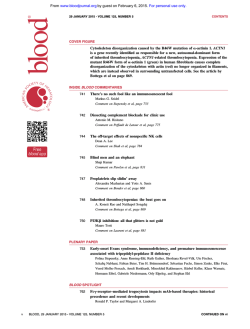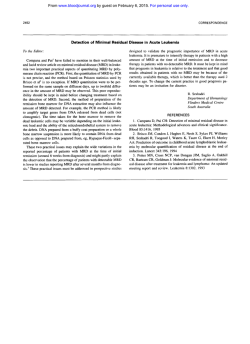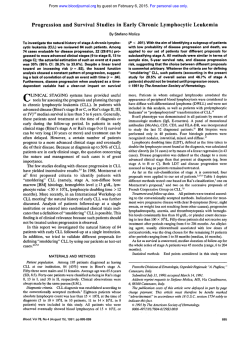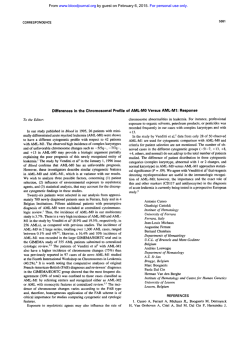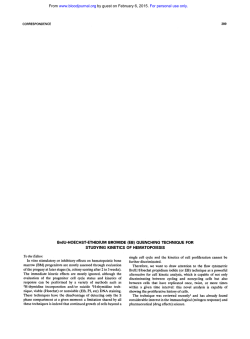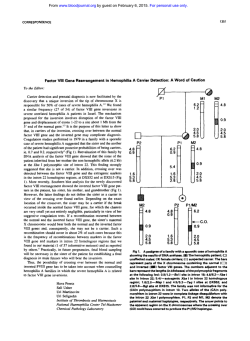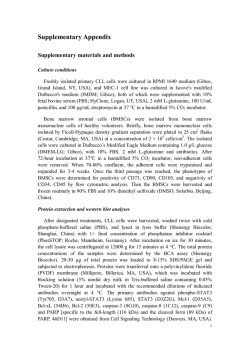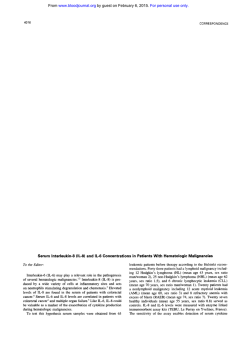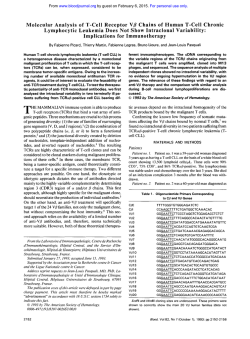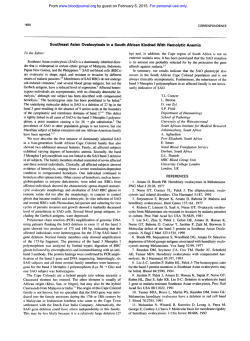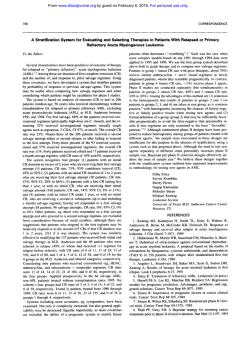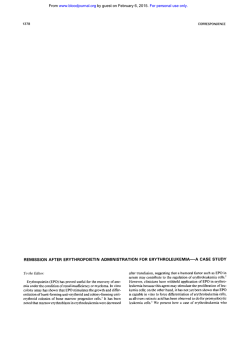
Further Evidence for In Vivo lsotype Switching in B-Cell
From www.bloodjournal.org by guest on February 6, 2015. For personal use only. CORRESPONDENCE Further Evidence for In Vivo lsotype Switching in B-Cell Chronic Lymphocytic Leukemia To the Editor: In a recent article in Blood, Malison et a l l have reported experimental evidence in support of in vivo isotype switching in B-cell chronic lymphocytic leukemia (CLL). The evidence was that freshly isolated sIgM’ sIgG- sIgK B-CLL cells nevertheless express IgG and IgA transcripts that have identical VDJ segments and that these cells may be induced in vivo to secrete IgG and IgA. Based on our own published observations: we most definitely agree with this conclusion. We have described an unusual case of small lymphocytic 1ymphomdCLL in which the small B lymphocytes were sIgM+ sIgA-K+, whereas the larger B prolymphocytes within the proliferation centers were sIgM- sIgA+ K + . Southem blot DNA analysis showed that there were 2 Jh rearrangements (I that cohybridized with a C, probe and 1 that cohybridized with a C, probe), whereas there was but a single C, rearrangement. These data therefore indicated that the larger IgAf prolymphocytes arose from the small IgM+ lymphocytes by an in vivo heavy chain isotype switch. The idea proposed by Malison et al’ that the translation blockade of the CLL cells is due to a deficient microenvironment is very intriguing. In our case, the fully switched cells were larger prolymphocytes that congregated in proliferation centers. The proliferation center of CLL vaguely resembles a germinal center yet is deficient in cells that may be important in promoting complete isotype switching, ie, follicular dendritic cells and T ~ells.3.~ Indeed, in our case, the rare T cells that were present were admixed with the diffuse small lymphocytic infiltrate while sparing the proliferation centers. As suggested by Malison et al,’ in some cases other signals, eg, autoantigen, may provide the necessary signals for isotype switching.5 Thus, although full translation of isotype-switched Ig in CLL cells is only rarely identified in vivo, it may be that under some unusual circumstances the signals are generated within germinal center-like proliferation centers.’ S. David Hudnall Department of Pathology University of Texas Medical Branch at Galveston Galveston, Tx James R. Berenson Department of Medicine UCLA Los Angeles, CA REFERENCES 1. Malison F, Fluckiger A-C, Ho S, Guret C, Banchereau J, Martinez-Valdez H: B-chronic lymphocytic leukemias can undergo isotype switching in vivo and can be induced to differentiate and switch in vitro. BIood 87:717, 1996 2. Hudnall SD, Berenson J R Clonal heavy chain isotype switching within the proliferation center of a small lymphocytic lymphoma: Implications regarding the origin of proliferation centers. Hum Pathol 24:796, 1993 3. Toellner K-M,Scheel-Toellner D, Sprenger R, Duchrow M, Trumper LH, Emst M, Flad HD, Gerdes J: The human germinal centre cells, follicular dendritic cells and germinal centre T cells produce B cell-stimulating cytokines. Cytokine 7:344, 1995 4. Ratech H, Sheibani K, Nathwani BN, Rappaport H: Immunoarchitecture of the “pseudofollicles” of well differentiated (small) lymphocytic lymphoma: A comparison with true follicles. Hum Pathol 19:89, 1988 5. Schroeder H W Jr, Dighiero G: The pathogenesis of chronic lymphocytic leukemia: Analysis of the antibody repertoire. Immunol Today 15:288, 1994 From www.bloodjournal.org by guest on February 6, 2015. For personal use only. 1996 87: 4481 Further evidence for in vivo isotype switching in B-cell chronic lymphocytic leukemia [letter; comment] SD Hudnall and JR Berenson Updated information and services can be found at: http://www.bloodjournal.org/content/87/10/4481.citation.full.html Articles on similar topics can be found in the following Blood collections Information about reproducing this article in parts or in its entirety may be found online at: http://www.bloodjournal.org/site/misc/rights.xhtml#repub_requests Information about ordering reprints may be found online at: http://www.bloodjournal.org/site/misc/rights.xhtml#reprints Information about subscriptions and ASH membership may be found online at: http://www.bloodjournal.org/site/subscriptions/index.xhtml Blood (print ISSN 0006-4971, online ISSN 1528-0020), is published weekly by the American Society of Hematology, 2021 L St, NW, Suite 900, Washington DC 20036. Copyright 2011 by The American Society of Hematology; all rights reserved.
© Copyright 2026
